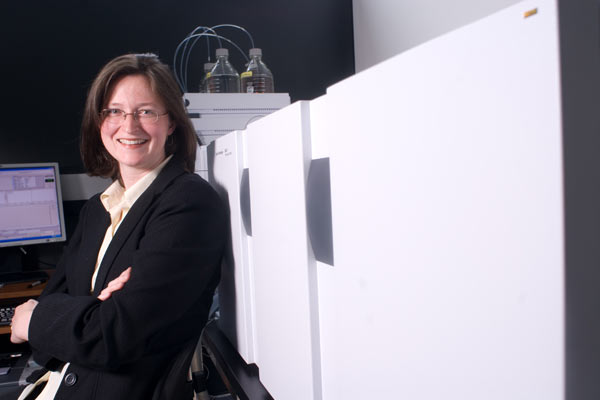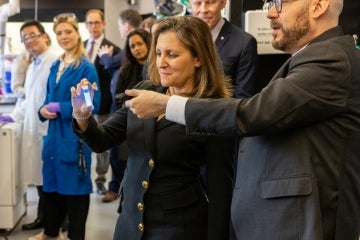
Connaught Fund injects more than $1 million into U of T research
Published: January 29, 2013
The Connaught Fund, the University of Toronto’s premier internal funding program, has announced the results of its Innovation Awards and Summer Institute Awards, investing more than $1 million in projects that span the disciplines.
One of the Innovation Award winners is Professor Carolyn Cummins of the Leslie Dan Faculty of Pharmacy, who received $100,000 for her work developing a new drug to prevent the side effects associated with the treatment of inflammatory diseases.
Diseases such as rheumatoid arthritis, inflammatory bowel disease and asthma are characterized by inflammation and are treated with a class of drugs called glucocorticoids. The problem is that glucocorticoids cause severe side effects, including diabetes, fatty liver, muscle wasting and osteoporosis.
Cummins and her collaborators, including Dr. Arturo Orellana, an organic chemist at York University, are developing a new drug that appears to interrupt the negative effects of anti-inflammatory drugs.
“The award will allow us to do two things,” said Cummins. “First, we’ll be able to design better compounds to prevent the side effects of chronic glucocorticoids. Second, we’ll be able to test whether our drug prevents muscle wasting and osteoporosis—we already know that when used in combination with a glucocorticoid, it inhibits fatty liver and diabetes.
“There’s a huge potential market—there are so many people on anti-inflammatories who could benefit from this research.”
“Congratulations to all the winners,” said Professor Paul Young, U of T’s vice-president (research and innovation), and chair of the Connaught Committee. “All the Connaught programs are meant to reward the most promising, visionary research on campus. These projects have the potential to make enormous impact on the lives of Canadians.”
In addition to Cummins, eleven other researchers have won the Connaught Innovation Award, receiving between $20,000 and $100,000 each to help with technology development, commercialization and knowledge transfer. They are:
• Constantin Christopoulos of civil engineering, “Development of viscoelastic coupling damper for enhanced dynamic performance of high-rise buildings.”
• Axel Guenther of mechanical and industrial engineering, “Skin printer for wound dressings.”
• Pierre Sullivan of mechanical and industrial engineering, “Advanced miniature ion mobility spectrometry for biomarker identification with integrated sample processing stage.”
• Ping Lee of the Leslie Dan Faculty of Pharmacy, “Controlled-release nitric oxide delivery system for ophthalmic applications.”
• Adam Rosebrock of the Donnelly Centre for Cellular and Biomolecular Research, “Combinatorial synthesis of DNA libraries: a novel technology enabling fully customizable, rapidly deployable reagents for diagnostics, functional genomics, and gene synthesis.”
• Dwight Seferos of chemistry, “Development of a nanotube-based energy storage device.”
• Yu Sun of mechanical and industrial engineering, the Edward S. Rogers Sr. Department of Electrical and Computer Engineering, and the Institute for Biomaterials and Biomedical Engineering, “Development of an automated cell counting system for clinical Kleihauer-Betke test.”
• Paul Yoo of the Institute for Biomaterials and Biomedical Engineering and the Edward S. Rogers Sr. Department of Electrical and Computer Engineering, “Novel electrical neuromodulation therapy for the treatment of overactive bladder symptoms.”
• Zheng-Hong Lu of materials science and engineering, “White organic light emitting diodes for lighting applications.”
• Ridha Ben Mrad of mechanical and industrial engineering, “An ultra-thin MEMS electrostatic actuated and variable stiffness platform for autofocus and lens stabilization in cell phone cameras.”
• Shahrokh Valaee of the Edward S. Rogers Sr. Department of Electrical and Computer Engineering, “Crowdsourcing for indoor location estimation.”
Three proposals for summer institutes, which bring together graduate students, post-doctoral fellows and other researchers to foster interdisciplinary collaboration and creative new research methods, were also awarded funds.
Professor Ron Deibert of political science and U of T’s Citizen Lab has received $150,000 to host a series of three summer institutes called “Monitoring Internet openness and rights from a multidisciplinary perspective.”
The award, said Deibert, “will allow us to bring together researchers from different disciplines to share techniques, trade craft, and discuss ethical issues and other practical considerations around monitoring the Internet for threats to openness and security. The area is one that the Citizen Lab has pursued over the last decade, but we now see many more researchers from many different disciplines in the field. We’d like to use this opportunity to bring as many of them as we can together to share ideas and learn how we might collaborate further in the future.”
Other winners of the summer institute award are:
• Norman Murray of the Canadian Institute for Theoretical Astrophysics, “International Summer Institute for Modeling in Astrophysics (ISIMA) 2014: Gravitational dynamics.”
• Anver Emon of Law, “The study of Islam and Muslims in the university: Pedagogies of engaging the subject.”
Both awards are part of the University’s suite of Connaught Programs and funding decisions are made based on a peer-review process. Founded in 1972, the Connaught Fund was created from the sale of Connaught Laboratories, which first mass-produced insulin, the Nobel award-winning discovery of U of T professors Frederick Banting, Charles Best, James Collip and J.J.R. Mcleod. The university has overseen the fund in the years since, awarding more than $120 million to U of T researchers for work that will have a transformative impact. Today, the fund invests approximately $3 million annually in emerging and established scholars.


